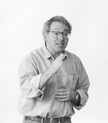
 One operating principle in science is that it is easier to solve problems if we
know what they are. I believe that it is not yet time to reinvent lower-division
teaching of science because we have not yet agreed on the problems we must solve
or what we want our students to take with them when they leave us. More basically,
we have not yet identified principles by which we could reinvent educational programs
in the Faculty of Science. To this end I will suggest some very basic ideas about
teaching and learning in general, and about teaching and learning science.
One operating principle in science is that it is easier to solve problems if we
know what they are. I believe that it is not yet time to reinvent lower-division
teaching of science because we have not yet agreed on the problems we must solve
or what we want our students to take with them when they leave us. More basically,
we have not yet identified principles by which we could reinvent educational programs
in the Faculty of Science. To this end I will suggest some very basic ideas about
teaching and learning in general, and about teaching and learning science.
Limitations of human memory capacity make it impossible to remember large amounts of unrelated information. Among many other things, what we mean by intelligence rests on the ability to discover, remember, and use relationships among facts, "chunking" large information sets into manageable units.
It is useful to consider that the fundamental unit of understanding is not the fact but the relationship, and that "scientific memory" comprises a network of such relationships. One implication is that we remember the facts of scientific arguments by remembering the logical structure in which they reside. I suggest that when people remember scientific details for more than a few days, they often remember the structure and make up the details. (I do.)
To illustrate a logical structure by exposing students to it is not the same as to develop it. For a teacher to develop an argument is not the same as for a student to develop it. These points are subtle, but they are important to consider if we expect students to develop scientific arguments.
Many issues converge on this point. Most importantly, students must not think of arguments as noun-like objects that can exist in completed form, but as a verb-like communicative process, arguing, through which they can convince people. The metaphor of lawyers arguing in court usually makes this distinction clear to them, especially when they realize that we are the jury that they must convince in the end. It is worth considering that a basic unit of process in teaching may be the argument.
Two ways to develop logical structures can be called inductive and deductive. In the inductive approach, students confront sets of information and later confront a structure that unifies them.
In practice, the instructor "zooms out" from the details toward an integrated view of them. In the deductive approach, the instructor "zooms in" from global to increasingly local views of a phenomenon.
Science, as practiced by working scientists, requires both deduction and induction. To the extent that our own scientific ability rests in our performance of these operations, our objective must be for our students to perform them as well. This implies that in every science course, both teachers and students perform both operations repeatedly.
Students from incoming undergraduates to incoming graduate students have little experience of either induction or deduction in my experience. They find comparisons of all kinds difficult, usually for lack of simple linguistic structures (they do not understand what comparison is!), and find logical argumentation much more than difficult. If we are serious about argumentation, we must help students learn simple linguistic tools for comparison and simple logical structures such as syllogisms to help them link statements into trains of thought. We must teach them the power of simplifying assumptions; none of these things are obvious to the uninitiated.
Whether or not we blame others for failing to provide these tools, they didn't and so we must. If our revolution is a serious one, we must accept that things like this do not merely support learning the material; they are integral to the material and cannot be separated from it. If you doubt this, just consider the contingency of results on methods and experimental designs in your own work as a scientist.
Students have rarely had to make arguments at all, let alone formally and rigourously. Our students must begin sometime, and someone has to help them.
Students will risk their ideas in public as soon as they trust that their public wants to hear them. The first component of this "public" is us, because we hold such great power to discourage active, creative thought.
That we hold this power is known to all students before they meet us, and they believe it strongly because teachers before us have used it against them. (In a more cynical incarnation, I believed that the single most effective contribution of teachers to students is to destroy creative thought.) The fact is that most of our students suffered horribly from exactly this power for a long time before we meet them, if only through neglect. Unless we are very careful they will continue to suffer at our hands.